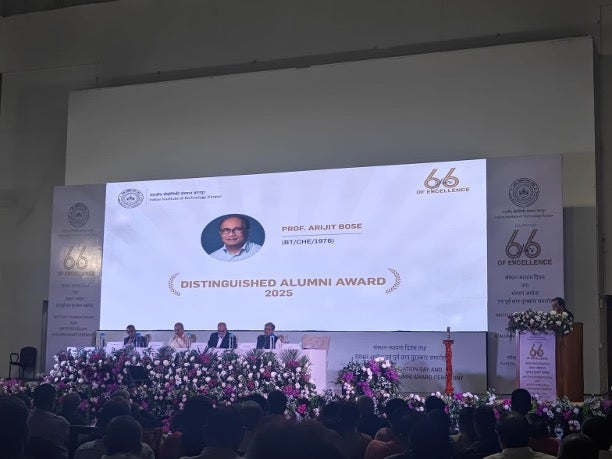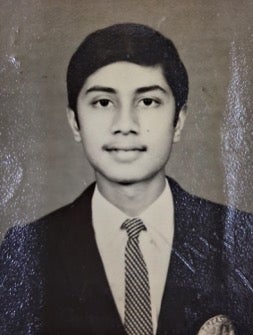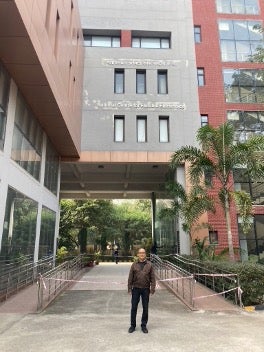University of Rhode Island chemical engineering professor Arijit Bose has been selected as a 2025 Distinguished Alumnus Award recipient by his alma mater, Indian Institute of Technology, Kanpur, India. The honor is the highest award given to its alumni in recognition of their outstanding achievements. IIT Kanpur is one of the premier institutions established by the Government of India that continues to make unparalleled contributions to teaching, research, and innovation.

“I am truly humbled by this award,” said Bose. “Especially considering the accomplishments of those who have received this award before me, the current awardees, and those that will follow in the coming years. The award really belongs to my students, collaborators, professors and of course my family.”
Started in 1989, the institute annually honors individuals who have made a mark in their respective fields of expertise. The Board of Governors of IIT Kanpur unanimously selected Bose as a recipient for 2025, serving as a testament to his exemplary professional accomplishments, commitment to excellence, and dedication to serving society at large by developing solutions for significant issues facing the industry today, including safety, endurance, storage capacity and supply chain stability.

Bose is a Distinguished Engineering Professor of chemical engineering, and mechanical engineering by courtesy, at the University of Rhode Island where he began teaching in 1982. He is also a Distinguished Visiting Professor of chemical engineering at the Indian Institute of Technology, Kanpur. He spent time as a research engineer at DuPont from 1981 to 1982, was a visiting scientist at MIT for a year in 1989 and again in 1995, a visiting senior scientist and visiting Fellow at Cabot Corporation, (2002-2004; 2009-2010) and a visiting Professor at the University of California, Berkeley in 2017 and 2024.

He also served as Department Chair of Chemical Engineering at URI from 2004-2009 and currently serves on the advisory board of the newly established Kotak School of Sustainability at the Indian Institute of Technology, Kanpur.

His research is in the development of safe, stable lithium-ion batteries. This includes modeling and use of machine learning to predict the state-of-health of lithium-ion batteries, magnesium-based batteries, and use of 3D solvent-free printing for manufacturing high-performance electrodes for batteries. Beyond electric vehicles, laptops and home energy storage applications, the improvement of small, light, safe and long-lasting batteries are important for powering underwater and aerial drones, implanted medical devices such as pacemakers, and sensors for wearable technology and any internet-connected device. Bose also specializes in understanding the impact of microplastics on ocean cyanobacteria and gut bacteria, using imaging, biological assays and atomic force microscopy used to image surfaces and measure properties at the nanoscale. He has made significant contributions to understanding wetting by surfactant solutions using a combination of experiments and numerical simulations and the creation of novel particle-stabilized emulsions for applications in helping minimize spread of deep-sea oil spills. He has 141 peer-reviewed publications in leading journals in his field and holds nine U.S. patents. His work has been supported by the National Science Foundation, Department of Energy, Rhode Island Department of Transportation, the Gulf of Mexico Research Initiative and by the state of Rhode Island.
Bose has supervised 22 Ph.D. students, 25 M.S. students and dozens of undergraduates throughout his career. “My proudest achievements are my students, many of whom have gone on to become leaders in their fields,” said Bose.
Bose co-founded Audiance, Inc. in 2019 (with colleagues at UC Berkeley and Stanford University), to develop safe, low-capacity-fade compact batteries for active implantable medical devices and other niche applications and serves as Audiance’s Chief Scientific Advisor. He has been presented twice with the URI College of Engineering’s Vincent and Estelle Murphy Award for outstanding research, and twice with URI’s intellectual property award. He was an Associate Editor of the IEEE Transactions in Nanotechnology from 2003-2008. He obtained a B. Tech. in Chemical Engineering from the Indian Institute of Technology, Kanpur in 1976, and a Ph.D. from the University of Rochester in 1981.
